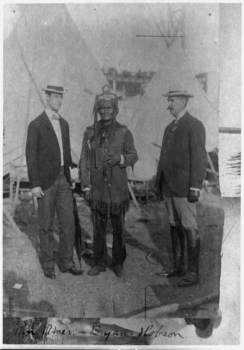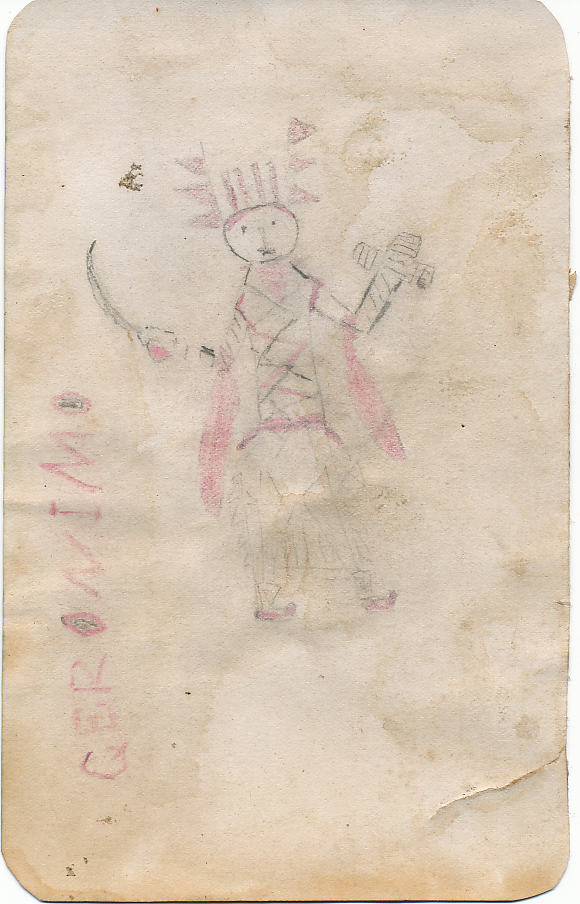Geronimo
Geronimo
Geronimo Signed Hand-Drawn Sketch - 1901
Geronimo signed and hand-drawn sketch of a figure believed to represent a gaan dancer, with headdress, feathers dangling from his upper arms, and a wand in each hand. The figure even has “cactus kickers” on his moccasins. This 3.75″ x 6″ drawing is backed with watermarked paper such as is commonly used for book endpapers. Small tear lower right that does not extend into drawing or signature. Minor surface stains, some of which appear to be water staining.
A nearly identical version of this signed drawing was sold in June 2008 by Cowan’s Auction House, well-known experts in fine American Indian and Western art, where owner Wes Cowan (who is also an appraiser on PBS’s Antiques Roadshow) estimated its value upwards of $20,000. As can be seen at the link, while Cowan’s item was in better condition, this appears to be only the second such Geronimo drawing known to come to market in recent history, making it an exceptionally rare artifact from the highly regarded Native American warrior.
Geronimo (1829-1909) was a Chiricahua military leader who was believed by his followers to have some spiritual “powers,” such as the ability to walk without leaving tracks and to survive gunshots. He led raids on both sides of the Southwestern border, eluding capture by both the Mexican and U.S. Armies for nearly three decades. He is often considered the last “hold out,” refusing to recognize American occupation of the region, and leading an independent band of native people.
Geronimo was finally captured in 1886 by a troop of the 4th Cavalry led by Captain Henry Lawton under General Nelson Miles. Geronimo himself gave credit to 1st. Lieut. Charles Gatewood, whom he knew and who spoke some Apache, as being the person who convinced him to surrender, but Lawton gave credit to a number of his men, and, of course, many others claimed the feat over the years. Geronimo would spend the remainder of his life as a prisoner of war. After he was moved to Fort Sill, OK in 1894, Geronimo was given some freedom.
He quickly understood commercialism and he became his own best PR man as he realized the value of all things connected with him. His appearances generated much interest at the Omaha Exposition of 1898, the Pan American Exposition at Buffalo in 1901, the St. Louis World’s Fair in 1904, Theodore Roosevelt’s inauguration parade in 1905, numerous Wild West shows, and other public events. Promoters of these events had to appeal to the War Department to obtain permission for his appearance. At many of the events Geronimo would sell his autograph, photographs of himself as well as bows and arrows. In his autobiography, Geronimo talks about his experience at the St. Louis World’s fair, “I often made as much as two dollars a day, and when I returned I had plenty of money more than I had ever owned before. I am glad I went to the Fair.”
At some point in his captivity, Geronimo learned to read a bit and write his name, and later even embraced Christianity. His writing always had a child-like quality, and he preferred pencil to pen. He seemed to like to embellish his signature, sometimes putting designs in the “G,” often filling in the “O’s,” as in this signature. Sometimes all letters were serifed, sometimes only a few were.
Contrary to this supposed life of leisure Geronimo and the Apache people suffered both physically and mentally. During their stay in Florida and Alabama many Apaches died of tuberculosis and other diseases. Throughout the time spent as a prisoner of war, Geronimo never stopped asking to be allowed to return to his homeland in the Southwest. He died a prisoner of war at Fort Sills.

Geronimo in the Indian Village at the 1901
Pan American Exposition, Buffalo, New York.
Image from the Library of Congress.
All Vintage Memorabilia autographs are unconditionally guaranteed to be genuine. This guarantee applies to refund of the purchase price, and is without time limit to the original purchaser. A written and signed Guarantee to that effect accompanies each item we sell.


